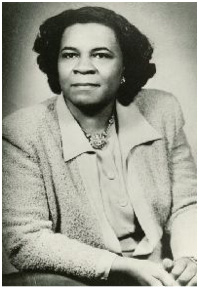 Rosa Slade Gragg
Rosa Slade Gragg
(1904 – 1989)
Rosa Slade Gragg was a civic leader who made contributions in the educational, social, and political arenas. She made history with numerous first achievements by a woman.
Born in Georgia, Gragg was a summa cum laude graduate of Morris Brown College in Atlanta. She furthered her studies at Tuskegee Institute, Wayne State University, and University of Michigan.
Understanding the importance of education in the struggle for Black progress, she founded the Slade-Gragg Academy of Practical Arts in 1947, the first Black vocational school in Detroit. Known as the Tuskegee of the North, it trained over 2,000 women and returning veterans. This was the first Black owned and operated business on Woodward Avenue in Detroit. Later, she led the establishment of a youth center, library, and archives for Bethel A.M.E., the second oldest Black church in Michigan.
Gragg understood the needs of black women. In 1941, she helped the Detroit Association of Colored Women's Clubs establish a clubhouse on Ferry Street, fighting redlining in the process. In 1958 after being elected to the Presidency of the National Association, she succeeded in having the Fredrick Douglass home in Washington, D.C., declared a national shrine by Congress. She was known to fight for Black people with skill, force, and money. She stated, “We cannot advance dependent on other people; we must build up an economic responsibility ourselves.” In 1960 Gragg was elected vice president of the Council of Women of the United States, affiliated with the International Council of Women of the World. She was the first Black president of the Detroit Public Welfare Commission. Through the years she has fostered better relations between Blacks and whites, serving as a lecturer on race relations.
Rosa Gragg was an advisor to three U.S. Presidents. Under President Roosevelt she was the only Black person on the Board of the National Volunteer's Participation Committee of Civil Defense. She helped open Detroit's first Civilian Defense Office. Under President Kennedy, she served on the Status of Women's Commission, the National Women's Committee on Civil Rights, and the Commission on Employment of the Handicapped. President Johnson appointed her to the Citizens Committee on Community Relations and the Defense Advisory Committee on Women in the Services.
Gragg died in 1989 and is buried in Section A2, Lot 200. She was inducted in the Michigan Women’s Hall of Fame in 1987 for her achievements in civil rights. She is remembered most for her concern for the struggles of Black women and for her work in her church and the Detroit community.
